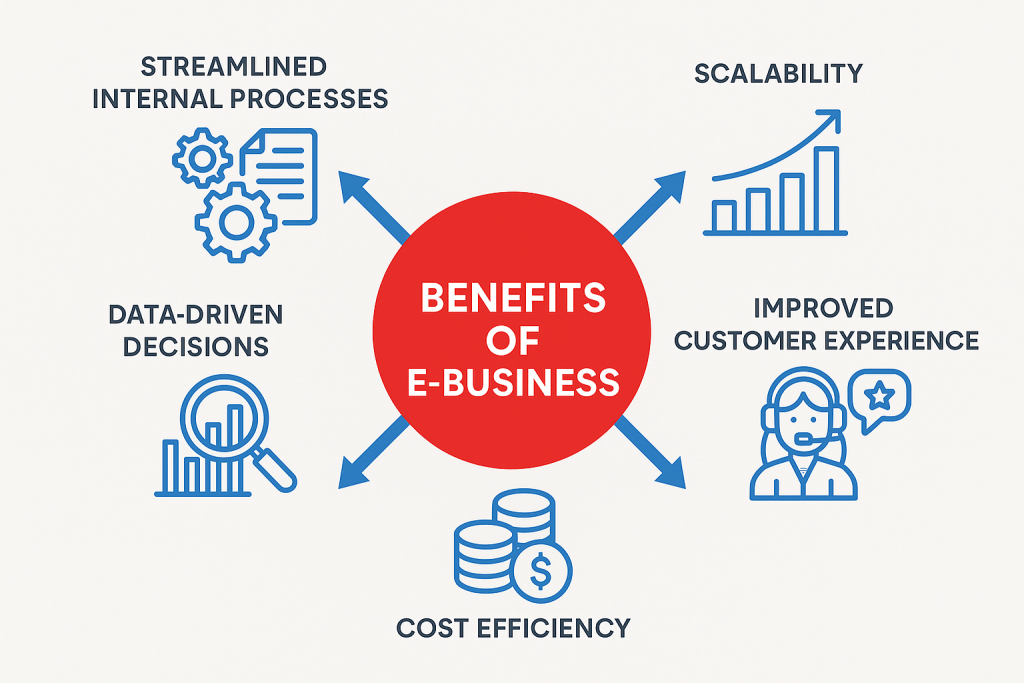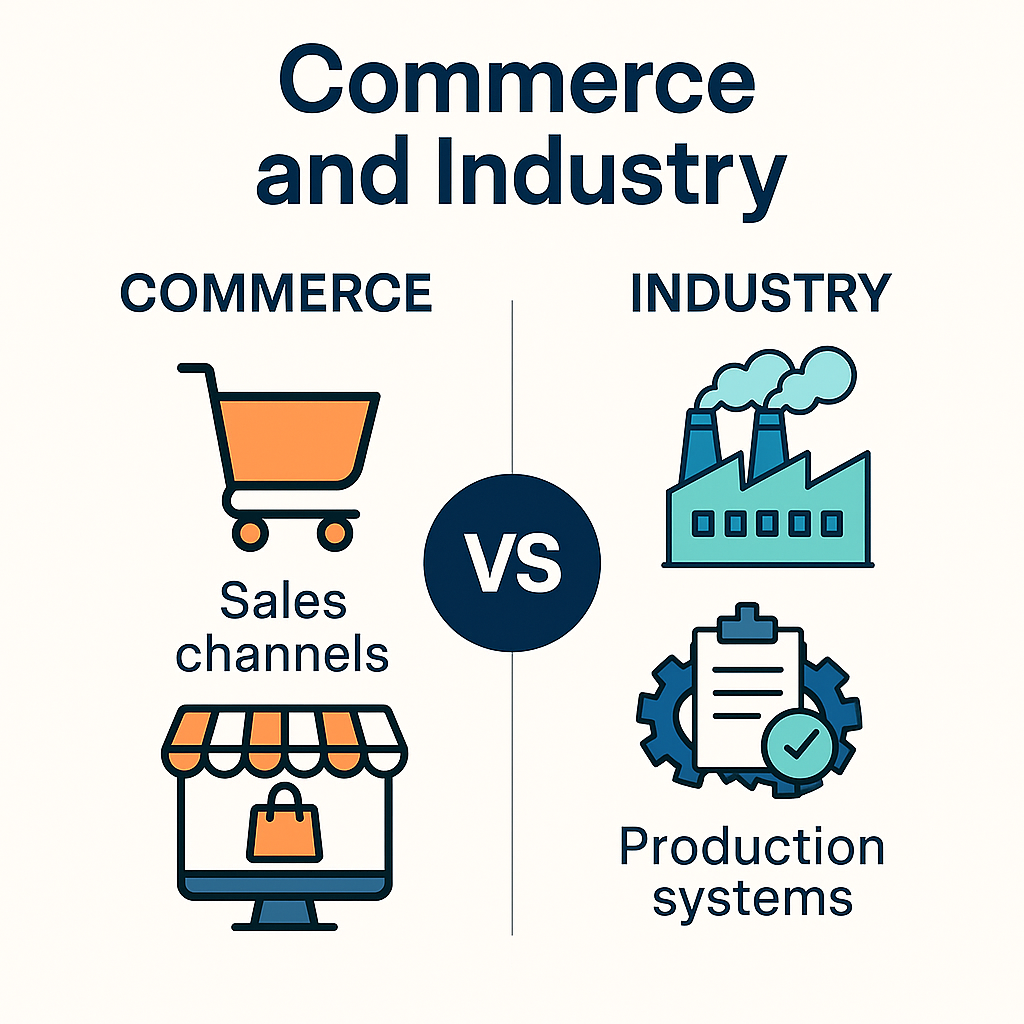Softpulse Infotech, a leading Shopify expert and Shopify Plus development agency, understands businesses often search for the difference between e‑commerce and e‑business. In this post, we’ll unpack the E‑Business meaning, what E-Business is, E‑Business definition, and highlight the difference between traditional commerce and E‑Commerce, while also covering the benefits of E‑Business, and exploring how electronic commerce and business interrelate. We’ll also touch on the difference between commerce and industry. Let’s dive in.
1. What Is E‑Business? (E‑Business Meaning & Definition)
When someone asks what E-Business is, they’re seeking the broader concept. The definition of e-business describes it as any business process carried out using digital technologies. E‑Business meaning covers platforms and software for internal functions like supply chain management, CRM, ERP, digital marketing, and customer service.
As Shopify experts, we at Softpulse Infotech often explain that E‑Business meaning includes the infrastructure (websites, servers, apps) that allow catalog management, order fulfillment, reporting, not just online sales. So, the definition of e-business is the digital backbone that makes modern commerce possible. In contrast, e‑commerce focuses purely on the transaction, buying and selling goods or services. We’ll explore the difference between E‑Commerce and E‑Business in detail.
2. E‑Commerce vs E‑Business: Key Differences
The difference between e‑commerce and e‑business is one of scope. E‑Commerce refers specifically to purchasing and selling over the internet. In contrast, e‑business covers all digital aspects of running a business. This includes electronic commerce and business operations, digital marketing, inventory management, data analytics, customer support, and beyond. When you search for “E‑Commerce and E‑Business difference”, you’re asking two levels: what is E‑Business (strategy/operations), versus e‑commerce (transactions).
| Aspect | E‑Commerce | E‑Business |
| Definition | Online buying and selling | Full digital business operations |
| What It Includes | Transactions (payments, storefronts, carts) | CRM, supply chain, digital marketing, customer service |
| Objective | Generate sales directly | Optimize all business processes |
| Scope | Narrow, transactional | Broad, strategic and operational |
| Examples | Shopify store, online marketplace | ERP systems, email automation, logistics integration |
Each column fully integrates the meaning of e-business and the definition of e-business, and clarifies the difference between commerce and industry by showing how electronic commerce and business activities differ from traditional industrial setups.
3. Difference Between Traditional Commerce and E‑Commerce
Many users search specifically for the difference between traditional commerce and E‑Commerce. Traditional commerce meaning and its involves physical storefronts, face‑to‑face negotiation, manual inventory control, and paper‑based accounting. E‑Commerce, however, enables in‑store‑less sales that are instant, location‑agnostic, and globally scalable.
In traditional commerce, the customer experience is limited by geography and business hours. E‑Commerce and E‑Business differ here: E‑Business coordinates multiple digital systems to serve the customer 24/7, while e‑commerce is the digital channel itself.
Benefits of E‑Business
What are the benefits of E‑Business? Here’s how an integrated digital approach pays off:

- Streamlined internal processes: Automation of inventory, orders, CRM, and marketing.
- Scalability: Expand globally without needing new physical locations.
- Data‑driven decisions: Analytics on customer behavior, demand forecasting, and supply chain.
- Improved customer experience: Faster responses, personalization, seamless checkout.
- Cost efficiency: Reduced overhead of manual workflows, paper, and physical infrastructure.
By understanding the benefits of E‑Business, businesses can move beyond what E-Business is to executing more innovative digital strategies.
Electronic Commerce and Business
When we talk about electronic commerce and business, we refer to the symbiotic relationship: e‑commerce is a revenue‑generating touchpoint, and e‑business supports everything behind the scenes. The synergy enables customer‑centric, data‑rich operations with measurable ROI.
For example, a Shopify Plus store (a domain where Softpulse Infotech excels) is an electronic commerce platform. But tracking orders, sending automated post‑purchase emails, managing returns, and planning marketing campaigns, this is E‑Business. The difference between e-commerce and e-business is thus complementary.
4. Difference Between Commerce and Industry
A deeper angle is the difference between commerce and industry. Industry refers to manufacturing or production sectors, creating goods, raw materials, or services. Commerce relates to the distribution, trading, and selling of goods. In digital terms:

- Industry = Production systems (factories, supply chain management)
- Commerce = Sales channels (stores, e‑commerce platforms)
This clarifies why we highlight the meaning of e-business: it straddles commerce and industry digitally. Integrated systems align manufacturing, inventory, and logistics with sales and marketing.
5. Why Choosing an Expert Agency Matters
Many companies wonder about the difference between E‑Commerce and E‑Business, but fail to build both properly. Without E‑Business, your e‑commerce platform may underperform, slow fulfilment, poor customer support, and limited marketing.
Softpulse Infotech provides full-service Shopify Plus development: storefront design, internal process automation, CRM integration, analytics dashboards, and returns/fulfillment workflows. That covers E‑Business meaning and ensures your Shopify store remains efficient, scalable, and profitable.
Softpulse Infotech: Your Shopify Experts & Shopify Plus Development Agency
As Shopify experts, Softpulse Infotech helps businesses transition from traditional commerce to digital commerce. We guide clients on what E-Business is, and implement Shopify Plus development agency services that expand both e‑commerce and e‑business operations. With our expertise, you gain the benefits of E‑Business—automation, scalability, analytics, while optimizing your electronic commerce and business performance.
6. Traditional Commerce vs E‑Commerce at Work
Imagine a retail brand operating a physical store. They ask: “What is E‑Business?” They might start selling online with E‑Commerce. However, without e‑business:
- Order errors and delays
- Poor marketing tracking
- Inventory mismatched
- Customer service bottlenecks
With full-stack E‑Business, processes integrate digital inventory syncs, email automation, analytics for decision-making. That’s the difference between e‑commerce and e‑business in practice. As a Shopify Plus development agency, Softpulse Infotech helps brands grasp the definition of e-business and realize its benefits.
7. Summary & Takeaway
- E-Business’s meaning is broader than e‑commerce.
- The definition of an e-business includes all digital business operations, not just sales.
- The difference between traditional commerce and E‑Commerce is digital vs physical sales.
- The benefits of E‑Business include scalability, efficiency, data, and customer experience.
- Electronic commerce and business operate together: one sells, the other supports.
- The difference between commerce and ecommerce industry trends explains how digital systems connect production and sales.
Softpulse Infotech, as a team of Shopify experts and a Shopify Plus development agency, empowers businesses to leverage both e‑commerce and e‑business seamlessly.
Final Thoughts
Understanding the difference between E‑Commerce and E‑Business is critical. Knowing what E-Business is (its function, structure, and definition) helps you invest wisely in technology and systems. Leveraging the benefits of E‑Business makes your electronic commerce and business integrated and high-performing. And by working with Softpulse Infotech, a trusted Shopify experts and Shopify Plus development agency, you can bridge the gap from traditional commerce to digital excellence.



